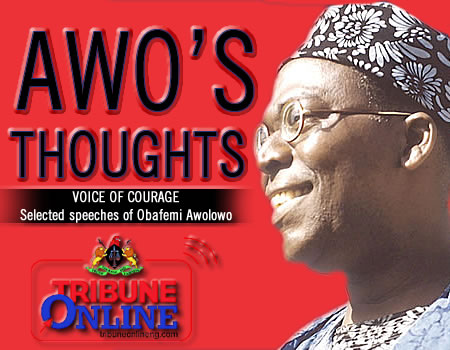Speech given in the Western House of Assembly, Ibadan, on 16 July, 1952.
I consider it an honour and a privilege to move the second reading of a Bill for a Law to make provision for Local Government in the Western Region, and for purposes connected therewith. For, when this Bill has been enacted into Law, if will mark an historic and an imperishable milestone on our road to political self-determination.
The importance of local government cannot be over-emphasised. It is the foundation on which the magnificient and massive superstructure of regional, state – or central government is erected. It is also the training ground for a large number of public-spirited citizens than can ever have room to operate on the regional or national level. The day-to-day business of a local government is most important for it affects the lives of all citizens within its jurisdiction for better or for worse.
It is true to say that in spite of the vital importance of local government, quite a number of nationalists in this country have not given this institution the attention and the close study that it deserves. It would be unfair to blame them for this apparent neglect. The political situation in which they found themselves were such as to encourage zeal for or initiative in political architecture. When Lord Lugard introduced the Indirect Rule system in what is now known as the Northern Region in the early part of this century and later extended it to the Southern Provinces of Nigeria, he did so in order to lay a strong and solid foundation for the imperialist edifice that was then in process of erection in Nigeria. The aim of British rule in Nigeria then had no resemblance whatsoever to the present admirable objective. The motive power behind British rule in this country at that time was chiefly economic. Political and military considerations were ancillary to the economic aspirations. The civil administration of the country was necessary in order to enable this economic motive to be exploited. Because of this original concept of our local administration, the evolution of local government in this country has been a comparatively slow and painful process. That is from the point of view of Nigerian nationalists. We have moved rather tardily from Lord Lugard’s principle of Indirect Rule to Sir Donald Cameron’s re-statement of that principle, and to the present haphazard and pseudo-democratic practices which have clustered around this system.
It must be stated, however, to the credit of our British overlords, that as time went on the aim of British rule in Nigeria as in other colonial territories – underwent, at least in theory, a radical change which called for the laying of a new and stronger foundation, and the erection of a better and bigger superstructure. But until lately, all that was done was a mere tinkering with the foundation and the erection of buttresses with occasional touches of renovation so as to make the old edifice have the appearance of strength and a new look.
It is therefore understandable why the nationalists in this country apparently ignore the foundation laid by the late Lord Lugard and demand with unabated vehemence the demolition of a foundation and a superstructure which were designed and erected to suit an entirely different set of objectives. It is, I must say, to the lasting credit of the British Government that in a world where, in spite of all protestation to the contrary, Might is still Right, they have yielded to popular clamour and have, by the instrumentality of what is now commonly known as the Macpherson Constitution, demolished the old imperialist structure and left us entirely free to erect a new one after our own heart.
It is our duty to aim at the erection of a new edifice, much nobler in conception, more artistic in design and more imposing in structure and extent than any that have hitherto been erected or contemplated.
In that event, it is our foremost duty, above everything else, to make sure that the foundation on which this new superstructure of ours will be laid is made as strong, solid, and lasting as human ingenuity can make it. It is in order to supply this basic fundamental and indispensable need that this Bill is being introduced.
We in this country, on the one hand, and our British over-lords, on the other, are now in complete accord as to what is the present aim of British rule in Nigeria. The aim is self-government for the people of this country. The only issue, however, on which there seems to be no consensus of minds between the two parties is the exact point in time when this self-government shall be attained.
It is, however, the declared policy of the Action Group that Nigeria shall attain self-government within five years of the commencement of this new Constitution. This is by no means an empty declaration. It is a sincere enunciation of a political programme which was carefully thought out and to which we are irrevocably committed. That being so, it is incumbent on us to make a bold venture now into the realm of local self-government, for it is obvious that there can be no genuine national self-government unless we are able to govern ourselves at the local level with efficiency and distinction. Therefore, the aim of the new law, the Bill for which this Hon. House is being now called upon to pass, is to confer, after necessary reorganization, local self-government on our existing Native Authorities. By local self-government is meant, quite simply a system of local government wherein local councils make, accept responsibility for, and implement their own decisions subject only to such control as may be exercised by the people through their own Regional Government.
In the course of my speech, it will be necessary for me to explain this Bill Part by Part, but before I do, I consider it proper, at this stage, to try to compare and contrast the principle of indirect rule with the principle which forms the basis of the present reform.
Lord Lugard, the great and brilliant author of Indirect Rule in Nigeria, was very blunt and straightforward in his statement of the principle of Indirect Rule. Quite simply, it meant, according to him, British rule through native chiefs.
I will quote some of Lord Lugard’s own words in his well known publication (now out of print) entitled ‘Political Memoranda
CONTINUES NEXT WEEK
READ ALSO FROM NIGERIAN TRIBUNE






